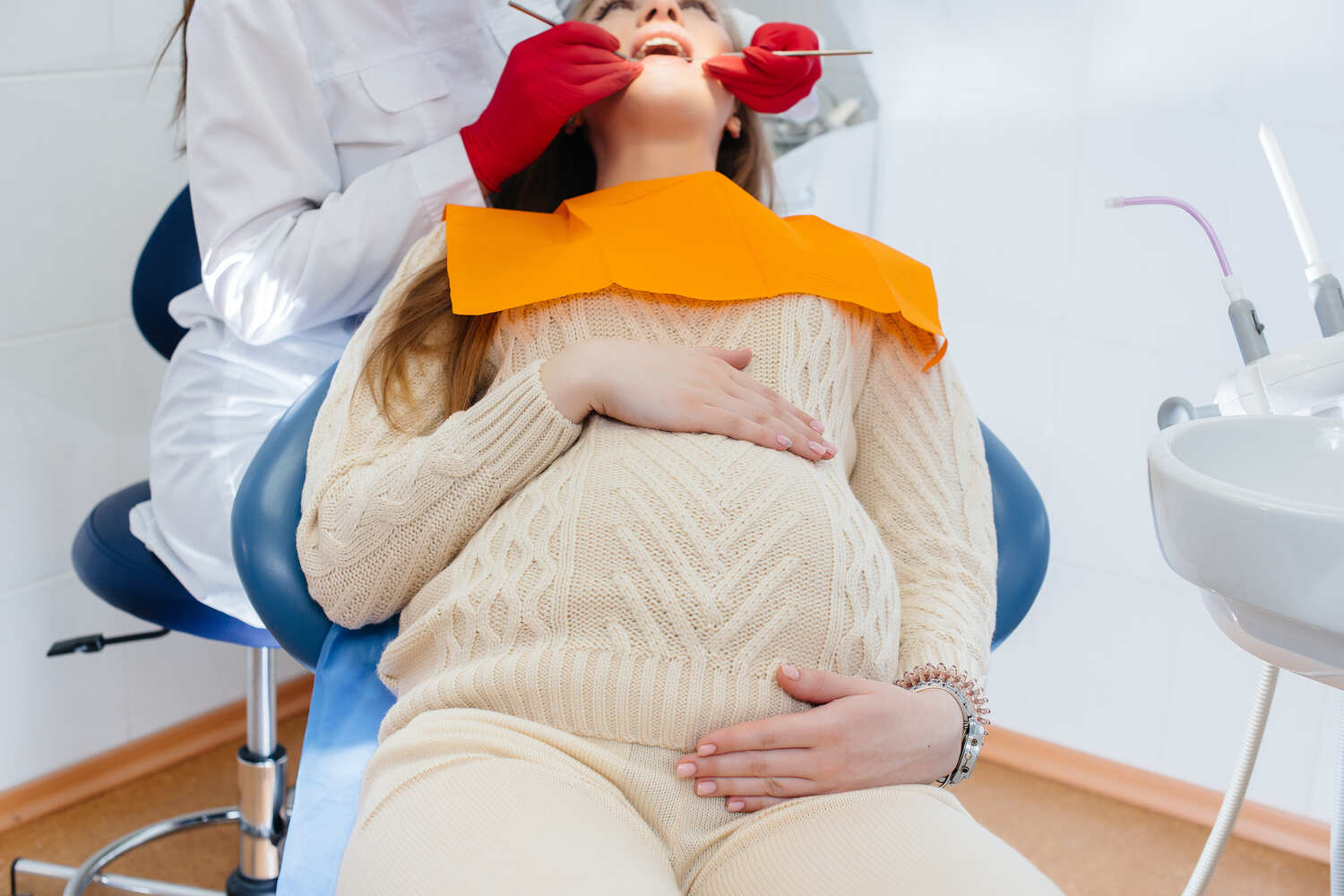
Pregnancy can be a life-changing phase in your life. While it is overwhelming to nurture a little life within yourself, pregnancy is also accompanied by several ups and downs. Hormonal changes during pregnancy can wreak havoc and increase your risk of developing oral problems. These dental concerns could be in the form of tooth decay, or gum disease. Thus, it is essential to take extra care of your oral health during pregnancy and stay in regular contact with your dentist if you notice any signs of oral diseases.
While it is safe to undergo routine dental checkups and professional cleanings during pregnancy, you may be apprehensive about tooth extraction. Getting a tooth pulled out has never been a convenient procedure for anyone. And this may be bothersome all the more if you are pregnant. This poses the question – are tooth extractions during pregnancy safe? We will help you find answers to all your queries and overcome your fear. So keep reading!
In This Article
- Is Tooth Extraction During Pregnancy Safe?
- How To Know You May Need A Tooth Extraction?
- What Are The Safety Measures You Take While Extracting Teeth?
- Tips To Help You Prepare For Tooth Extraction
- Oral Care During Pregnancy
- FAQs
Is Tooth Extraction During Pregnancy Safe?
Being pregnant brings a lot of joy and excitement. But, it can come with a lot of changes- both good and bad as well. Oral care is a crucial part of your well-being which is often neglected especially during pregnancy [1]. Poor oral hygiene, hormonal fluctuations, food cravings, and increased blood volume can lead to compromised oral health leading to tooth decay, gum disease and tooth extraction during pregnancy [2].
Often you may be anxious about getting dental procedures, fearing about the well-being of your baby. Oral infections can harm your baby if not treated on time. Research studies have shown that untreated oral infections in the form of extensive tooth decay and gum disease pose a risk of preeclampsia, premature birth, and low birth weight [1]. Thus, seeking dental care at the earliest during pregnancy is important.
Dental work during pregnancy, especially tooth extraction, is considered safe according to the American Dental Association (ADA) [3]. However, this may depend on several factors such as the type of dental problems, severity of the infection, and the stage of pregnancy. Tooth extractions may be necessary to eliminate pain and discomfort. The benefits of performing an extraction outweigh the minor risks associated with extractions.
How To Know You May Need A Tooth Extraction?

Your mouth and body are connected. Untreated oral problems can affect your general health and your baby. Therefore it is essential to consult your dentist at the earliest signs of oral diseases for careful monitoring throughout your pregnancy.
You may need a tooth extraction if you suffer from any of the following signs [4]:
- Excruciating tooth or gum pain that may negatively impact your routine
- Risk of further infections
- Risk of permanent damage to the tooth
- Red, swollen, bleeding, painful gums
- A severely decayed tooth
- Extensively broken or fractured tooth
- Chewing or speech difficulties
- Impaction of a wisdom tooth resulting in pain and discomfort
- Extreme sensitivity to heat, cold, or sugar
However, if you require a tooth extraction for cosmetic reasons not causing any pain and discomfort, you can wait until your baby is born.
What Are The Safety Measures You Take While Extracting Teeth?

Your dentist will evaluate your mouth to assess your teeth and gum health. If the dentist deems that a tooth extraction is necessary, they will take the necessary safety measures and precautions while extracting teeth. These include:
1. Ideal Trimester
Dental treatments are usually performed during the second trimester [5]. This is the ideal period when most of your pregnancy-related symptoms like nausea, morning sickness, and abdominal cramps settle down making you comfortable. Furthermore, this is the time when most of the fetal development is completed.
2. Dental Radiograph
Extractions require dental radiographs to evaluate the affected tooth and study its root morphology. This facilitates a smooth extraction procedure with minimal side effects. Your dentist will use lead aprons to cover yourself to protect your unborn fetus from radiation exposure [5].
3. Sedation
Your dentist will opt for a safe form of sedation, usually local anesthesia such as lidocaine to extract a tooth [6]. Local anesthesia when injected near the affected tooth will generally not travel through your bloodstream. An appropriate dose will be administered and your vitals will be monitored throughout the procedure. This greatly reduces your risk of anesthesia-related complications.
4. Medication
Your dentist will prescribe medicines like painkillers and antibiotics that won’t harm your unborn child [1]. Inform your dentist about any drug allergies and the pregnancy medicines you have been taking. This prevents the risk of any life-threatening complications. Also, certain medications may impair normal healing and delay your recovery.
Tips To Help You Prepare For Tooth Extraction

Preparing yourself for a tooth extraction is essential. This helps to enhance the treatment outcome and prevent any complications that may arise during or after the extraction.
The following tips can help you prepare for tooth extraction:
- Discuss the extraction procedure with your dentist which can help ease your anxiety and fear. Your dentist will explain the necessity of the procedure and post-extraction care instructions for optimal healing and smooth recovery.
- Inform your dentist about your medical history and past surgeries or tooth conditions suffered. Systemic diseases like diabetes, hypertension, heart disease, and impaired immunity, should also be brought to your doctor’s notice. These may greatly alter the treatment outcome if not addressed appropriately.
- Inform your dentist about any history of allergies related to medications or anesthesia.
- Refrain from taking medications such as blood thinners a few hours (preferably 8 hours) before the procedure to prevent excess bleeding.
- Arrange for transportation to get back home after a tooth extraction since you may not be advised to drive or ride due to the effects of anesthesia.
- Remove all jewelry, and wear loose clothing when you come to the dental clinic.
- Avoid smoking or drinking alcohol at least 6 to 8 hours before extraction since it may delay wound healing.
- Discuss with your dentist how long after the procedure you can resume your other medicines like vitamin, and calcium supplements.
Oral Care During Pregnancy

Oral health is an important aspect of your overall health and well-being. Good oral care becomes all the more essential during pregnancy due to hormonal changes. Remember to follow these dental care tips for optimal oral health [1]:
- Brush, and floss your teeth twice daily with a soft-bristled toothbrush
- Rinse your mouth with an appropriate antiseptic mouthwash
- Avoid sugary foods and drinks
- Eat a well-balanced diet including fruits, vegetables, proteins, and whole grains for healthy teeth and gums
- Visit your dentist when you notice any signs of oral diseases
Getting a tooth pulled out is extremely distressing, especially if you are pregnant. But technically it’s a safe procedure even during pregnancy when performed by a skilled dentist by taking all the necessary precautions. Safety measures during radiographs, sedation, and medicine prescriptions can help prevent any untoward complication or harm to your unborn baby.
Discuss your agony and expectations related to tooth extractions with your dentist. This helps design an appropriate treatment plan for you to sail through the procedure and recovery period easily. You do not have to suffer from tooth pain silently. Seek dental care at the right time to enjoy all the perks of a happy pregnancy.
FAQs
1. Is Dental Anesthesia Safe During Pregnancy?
Dental anesthesia used during any stage of pregnancy for regular and emergency care is safe. Generally, dentists use local anesthetic solutions that are injected near the affected tooth to numb the area. This eases the pain and discomfort associated with dental treatments, especially tooth extractions.
2. Which Trimester Is Safe For Dental Treatment?
The second trimester is considered to be the safest for non-emergency dental treatments when the fetus has already developed. The first trimester may not be ideal owing to other symptoms like nausea, morning sickness, and the fact that the baby is undergoing a lot of developmental changes. The third trimester may be uncomfortable, especially when lying down on the dental chair for long periods.
References
- Oral care in pregnancy – [https://www.ncbi.nlm.nih.gov/pmc/articles/PMC6883753/]
- Pregnancy-related dental problems: A review – [https://www.ncbi.nlm.nih.gov/pmc/articles/PMC10845246/]
- Pregnancy – [https://www.ada.org/en/resources/research/science-and-research-institute/oral-health-topics/pregnancy#]
- Oral Surgery, Extraction of Teeth – [https://www.ncbi.nlm.nih.gov/books/NBK589654/]
- Management of pregnant patients in Dentistry – [https://www.ncbi.nlm.nih.gov/pmc/articles/PMC3768073/]
- Use of local anesthetics for dental treatment during pregnancy; safety for parturient – [https://www.ncbi.nlm.nih.gov/pmc/articles/PMC5564152/]
